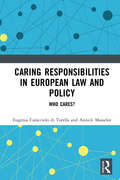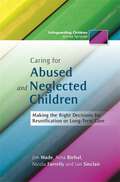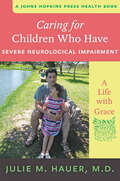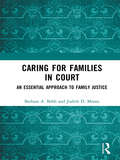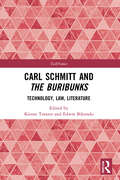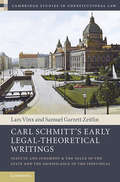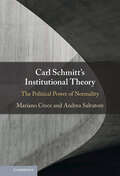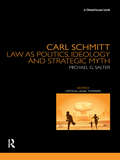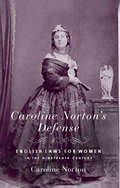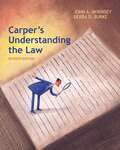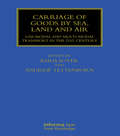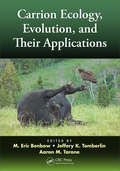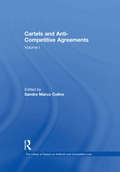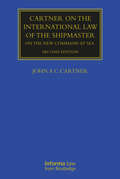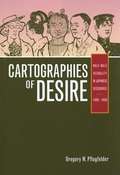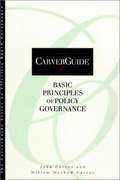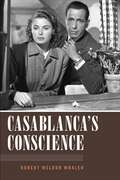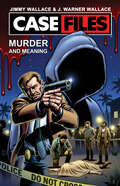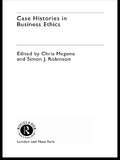- Table View
- List View
Caring Responsibilities in European Law and Policy: Who Cares?
by Annick Masselot Eugenia Caracciolo di TorellaThis book explores the emerging engagement of EU law with care and carers. The book argues that the regulation of care by the EU is crucial because it enables the development of a broad range of policies. It contributes to the sustainability of society and ultimately it enables individuals to flourish. Yet, to date, the EU approach to regulating the caring relationship remains piecemeal and lacks the underpinning of a cohesive strategy. Against this backdrop, this book argues that the EU can and must take leadership in this area by setting principles and standards in accordance with the values of the treaty, in particular gender equality, human dignity, solidarity and well-being. The book further makes a case for a stronger protection for carers, who should not only be protected against discrimination, but should also be supported, valued and put in a position to make choices and lead full lives. In order to achieve this, a proactive approach to rebalancing the relationship between paid and unpaid work is necessary. Ultimately, the book puts forward a series of legal and policy recommendations for a holistic approach to care in the EU.
Caring for Abused and Neglected Children
by Ian Sinclair Jim Wade Nina Biehal Nicola FarrellyThe decision whether or not to reunify a child in care with their birth family is one of the most serious taken by children's services, and often involves considerable risk. This book examines the long-term consequences of this decision for children who entered public care for abuse or neglect. It compares the experiences and progress of children who remained in care or returned to their birth families up to four years after the decision was taken. It covers how the decision is made, the factors taken into account when making it and provides important suggestions for effective decision-making. It compares the progress made by the children in relation to their safety, stability and emotional well-being. The book demonstrates that, contrary to common belief, long-term care can be a positive option for maltreated children. This book provides important messages for reunification policy and practice in relation to maltreated children. It will be essential reading for social work practitioners, researchers and policy makers.
Caring for Children Who Have Severe Neurological Impairment: A Life with Grace (A Johns Hopkins Press Health Book)
by Julie M. HauerAn expert physician empowers parents to make informed decisions about their child’s care.Global impairment of the central nervous system, whether stable or progressive, is often called severe neurological impairment (SNI). A child who has SNI will be cared for both by specialist clinicians and by parents at home. A parent is a child’s best expert and advocate, and many parents become highly skilled in managing their child's care. This guide provides information to help parents increase their knowledge and improve their caregiving skills. In Caring for Children Who Have Severe Neurological Impairment, Dr. Julie M. Hauer advocates shared decision making between family caregivers and healthcare providers. She details aspects of medical care such as pain, sleep, feeding, and respiratory problems that will be particularly useful to parents. Tables and key points summarize discussions for clear, quick reference, while case studies and stories illustrate how different families approach decision making, communication, care plans, and informed consent.Parents and other caregivers will find this book to be indispensable—as will bioethicists and clinicians in pediatrics, neurology, physical and rehabilitative medicine, palliative care, and others who care for children with neurological and neuromuscular disorders. Dr. Hauer offers hope and practical coping strategies in equal measure.
Caring for Families in Court: An Essential Approach to Family Justice
by Barbara A. Babb Judith D. MoranIn many US courts and internationally, family law cases constitute almost half of the trial caseload. These matters include child abuse and neglect and juvenile delinquency, as well as divorce, custody, paternity, and other traditional family law issues. In this book, the authors argue that reforms to the family justice system are necessary to enable it to assist families and children effectively. The authors propose an approach that envisions the family court as a "care center," by blending existing theories surrounding court reform in family law with an ethic of care and narrative practice. Building on conceptual, procedural, and structural reforms of the past several decades, the authors define the concept of a unified family court created along interdisciplinary lines — a paradigm that is particularly well suited to inform the work of family courts. These prior reforms have contributed to enhancing the family justice system, as courts now can shape comprehensive outcomes designed to improve the lives of families and children by taking into account both their legal and non-legal needs. In doing so, courts can utilize each family’s story as a foundation to fashion a resolution of their unique issues. In the book, the authors aim to strengthen a court’s problem-solving capabilities by discussing how incorporating an ethic of care and appreciating the family narrative can add to the court’s effectiveness in responding to families and children. Creating the court as a care center, the authors conclude, should lie at the heart of how a family justice system operates. The authors are well-known figures in the area and have been involved in family court reform on both a US national and an international scale for many years.
Carl Schmitt and The Buribunks: Technology, Law, Literature (TechNomos)
by Kieran TranterIn 1918 a young Carl Schmitt published a short satirical fiction entitled The Buribunks. He imagined a future society of beings who consistently wrote and disseminated their personal diaries. Schmitt would go on to become the infamous philosopher of the exception and for a while the ‘Crown Jurist of the Third Reich’. The Buribunks – ironically for beings that lived only for self-memorialisation – has been mostly lost to history. However, the digital realm, with its emphasis on the informatic traces generated by human doing, and the continual interest in Schmitt’s work to explain and criticise contemporary constellations of power, suggests that The Buribunks is a text whose epoch has come. This volume includes the first full translation into English of The Buribunks and a selection of critical essays on the text, its meanings in the digital present, its playing with and criticism of the literary form, and its place within Schmitt’s life and work. The Buribunks and the essays provide a complex, critical and provocative invitation to reimagine the relations between the human and their imprint and legacy within archives and repositories. There is a fundamental exploration of what it means to be a being intensely aware of ‘writing itself’. This is not just a volume for critical lawyers, literary scholars and the Schmitt literati. It is a volume that challenges a broad range of disciplines, from philosophy to critical data studies, to reflect on the digital present and its assembled and curated beings. It is a volume that provides a set of fantastically located concepts, images and histories that traverse ideas and practices, play and politics, power and possibility.
Carl Schmitt's Early Legal-Theoretical Writings: Statute and Judgment and the Value of the State and the Significance of the Individual (Cambridge Studies in Constitutional Law)
by Lars Vinx Samuel Garrett ZeitlinMany of Carl Schmitt's major works have by now been translated, with two notable exceptions: Schmitt's two early monographs Statute and Judgment (first published in 1912) and The Value of the State and the Significance of the Individual (first published in 1914). In these two works Schmitt presents a theory of adjudication as well as an account of the state's role in the realization of the rule of law, which together form the theoretical basis on which Schmitt later developed his political and constitutional theory. This new book makes these two key texts available in English translation for the first time, together with an introduction that relates the texts to their historical context, to Schmitt's other works, and to contemporary discussions in legal and constitutional theory.
Carl Schmitt's Institutional Theory: The Political Power of Normality
by Mariano Croce Andrea SalvatoreIn 1922, Carl Schmitt penned Political Theology, the celebrated essay in which he elaborated on the notorious theory that the heart of politics lies in the sovereign power to issue emergency measures that suspend the legal order. Ever since, Schmitt's thinking has largely been identified with this concept, despite him renouncing it over time. Offering a comprehensive analysis of Schmitt's writings, Carl Schmitt's Institutional Theory provides an ambitious, novel perspective on Carl Schmitt and his legal and political thinking. By delving into Schmitt's output over his decades-long career, Mariano Croce and Andrea Salvatore explore Schmitt's varied and developing thoughts on exceptionalism, societal pluralism and the law as the progenitor and enforcer of normality. Challenging dominant interpretations, Croce and Salvatore dethrone the false centrality of certain key texts, and instead provide a more unified, coherent account of his institutional theory from across his long and controversial career.
Carl Schmitt: Law as Politics, Ideology and Strategic Myth (Nomikoi: Critical Legal Thinkers)
by Michael G. SalterThere continues to be a remarkable revival in academic interest in Carl Schmitt's thought within politics and social theory but this is the first book to address his thought from an explicitly legal theoretical perspective. Transcending the prevailing one-sided and purely historical focus on Schmitt’s significance for debates that took place in the Weimar Republic 1919-1933, this book addresses the actual and potential significance of Schmitt's thought for controversies within contemporary Anglo-American legal theory that have emerged during the past three decades. These include: the critique of liberal forms of legal positivism; the relative ‘indeterminacy’ of legal doctrine and the need for an explicitly interpretative approach to its range of meanings, their scope and policy rationale; the centrality of discretion and judicial law-making within the legal process; the important role played by ideological prejudices and assumptions in legal reasoning; the reinterpretation of law as a form of strategically disguised politics; the legal theoretical critique of universalistic approaches to "human" rights and associated liberal-cosmopolitan 'ideologies of humanity,' including the rhetoric of 'humanitarian intervention'; and the limitations of liberal constitutionalism and liberalism more generally as an approach to law. In Carl Schmitt: Law as Politics, Ideology and Strategic Myth, the author provides an overview and assessment of Schmitt's thought, as well as a consideration of its relevance for contemporary legal thought and debates.
Caroline Norton's Defense: English Laws for Women in the 19th Century
by Caroline NortonThis account of the author's experience at the hands of an "imperfect state of law" in early 19th-century England makes a passionate plea for equal justice for women. Largely as a result of this book the passage of the Married Women's Property Act and reform of the English Marriage and Divorce Laws occurred some years later.
Carper's Understanding The Law
by John A. McKinsey Debra BurkeLearn the basics of business law and what it means to you with UNDERSTANDING THE LAW, Seventh Edition. This popular text discusses how various aspects of the law affect the individual, highlighting the personal law issues that confront people in their everyday lives. UNDERSTANDING THE LAW uses engaging hypothetical and real examples to illustrate important points of the law and to inspire lively discussion with your peers. This edition incorporates new coverage of ethical issues and the law. These ethical and moral issues are covered in boxed readings as well as throughout each chapter. This edition also continues to incorporate coverage of international and comparative law throughout to give you essential knowledge for today's global marketplace.
Carriage of Goods by Sea, Land and Air: Uni-modal and Multi-modal Transport in the 21st Century (Maritime and Transport Law Library)
by Andrew Tettenborn Bariş SoyerWritten by a combination of top academics, industry experts and leading practitioners, this book offers a detailed insight into both unimodal and multimodal carriage of goods. It provides a comprehensive and thoroughly practical guide to the issues that matter today on what is a very complex area of law. From the papers delivered at the 8th International Colloquium organised by Swansea Law School's prestigious Institute of International Shipping and Trade Law, this original work considers current opinions, trends and issues arising from contracts of carriage of goods by sea, land, air, and multi-modal combinations of these, not to mention the legal position of vital participants such as freight forwarders, terminal operators and cargo insurers. The topics under discussion range through issues such as paperwork, piracy, liability for defective containers, damage in transit, the CMR Convention, and the possible effects of the Rotterdam Rules.An indispensable resource for transport lawyers, industry professionals, academics and post-graduate students of maritime law.
Carrion Ecology, Evolution, and Their Applications
by M. Eric Benbow Jeffery K. Tomberlin Aaron M. TaroneShortlisted for the 2018 TWS Wildlife Publication Awards in the edited book categoryDecomposition and recycling of vertebrate remains have been understudied, hampered largely due to these processes being aesthetically challenging (e.g., smell and sight). Technological innovations have provided the means to explore new and historically understo
Cartelization, Antitrust and Globalization in the US and Europe (Routledge Studies In The Modern World Economy Ser. #82)
by Mark S. LeClairThe uncovering of a great number of cartels in the industrialised world has left an unfortunate, yet significant, mark on global economic developments in recent years. Globalization has forced firms into more direct competition; the result has been global price-fixing. This situation has greatly challenged antitrust authorities. Taking a broad yet detailed approach, this work sets a practical explanation of the history of cartels and antitrust law in a sound theoretical framework, as well as providing suggestions as to how potential reforms of antitrust laws could improve the situation going forward. The book includes a comprehensive analysis of the motivations behind and perceived necessity for organisations to enter into cartels, and the success or otherwise of legislatures’ attempts to both uncover and prevent such cartels from taking place. A total of 24 price-fixing conspiracies uncovered in the US and Europe are examined as part of the analysis to demonstrate the globalization of collusion.
Cartels and Anti-Competitive Agreements: Volume I (The Library of Essays on Antitrust and Competition Law)
by Sandro Marco ColinoAntitrust is fast becoming a ’trending topic’, with over 120 countries having already adopted some form of competition legislation. This volume brings together carefully selected articles which reflect the evolution and progression of the regulation of joint conduct under competition law on both sides of the Atlantic, and which discuss principles of fundamental importance for antitrust law. The articles focus on various kinds of joint conduct between companies which might bear negative effects on competition, in particular on horizontal cartels and collusion between competitors. Attention is also paid to the debate surrounding the most adequate approach for vertical agreements, which take place between firms operating at different levels of production. Their effects on competition have traditionally been one of the most disputed issues in modern antitrust, and tend to divide the principal schools of thought that have influenced the evolution of competition policy around the world. The articles look primarily at two of the most established antitrust jurisdictions, namely the United States and the European Union. They discuss the general theoretical framework that has influenced the evolution of the law and policy; cover the most relevant practical developments; provide contrasting doctrinal views and pay particular attention to the main schools of thought that have influenced antitrust in the US and the EU; and are representative of the leading discussions in the course of antitrust history.
Cartels, Markets and Crime
by Bruce WardhaughThis study of the normative justification for the use of criminal sanctions as a means of cartel control goes beyond the historical and economic viewpoints by adding a normative evaluation of anti-cartel regimes and analysing cartel control in the USA, Europe and the UK. The analysis is unique in seeking to establish why, in a liberal society, criminal sanctions should apply to individuals who participate in this sort of activity. Although cartels have been rhetorically likened to theft and fraud, there are significant differences. Notwithstanding these differences, Cartels, Markets and Crime presents an argument for the criminalisation of economic collusion and, with this argument in mind, analyses the regimes of the USA, EU and UK and considers the possibility of global convergence.
Cartner on the International Law of the Shipmaster: On The New Command at Sea (Maritime and Transport Law Library)
by John A. CartnerThis unique book rethinks and rewrites the previous edition. It categorises simply the nine interactive legal duties of the shipmaster, analysing and relating them to laws and conventions within a single volume. Cartner on the International Law of the Shipmaster contends that command depends on decision-making, and that shipmasters are not provided sufficient, timely, relevant, and pertinent information for command decisions. The book proposes voyage planning follow the spacecraft model of the USA's National Aeronautics and Space Administration, providing readers with a metric for command. It constructively criticises the conventions and management and is aimed at reducing catastrophes by focusing on the hitherto elusive human factor in the shipmaster. Cartner proposes that command at sea be its own profession and discipline with those called to it specifically trained in its intricacies; he argues that current ships are not designed to be command-worthy or security-worthy and that management should reorder its relationships with shipmasters as tactical managers afloat. The insights the book provides are an invaluable aid to decision making for the modern civil commander and anyone association with this pivotal and essential profession. This book is a necessary reference and guide for shipmasters, technologists, naval architects, regulators, underwriters, students, practitioners and courts of maritime law and command worldwide.
Cartographies Of Desire: Male-male Sexuality In Japanese Discourse, 1600-1950
by Gregory M. PflugfelderIn this sweeping study of the mapping and remapping of male-male sexuality over four centuries of Japanese history, Gregory Pflugfelder explores the languages of medicine, law, and popular culture from the seventeenth century through the American Occupation. Pflugfelder opens with fascinating speculations about how an Edo translator might grapple with a twentieth-century text on homosexuality, then turns to law, literature, newspaper articles, medical tracts, and other sources to discover Japanese attitudes toward sexuality over the centuries. During each of three major eras, he argues, one field dominated discourse on male-male sexual relations: popular culture in the Edo period (1600-1868), jurisprudence in the Meiji period (1868-1912), and medicine in the twentieth century. This multidisciplinary and theoretically engaged analysis will interest not only students and scholars of Japan but also readers of gay studies, literary studies, gender studies, and cultural studies.
Cartridges and Firearm Identification
by Robert E. WalkerAt a time when crime scene television shows are all the rage amongst the civilian population, knowledge of firearm forensics is of paramount importance to crime scene analysts, police detectives, and attorneys for both the prosecution and the defense. Cartridges and Firearm Identification brings together a unique, multidisciplined approach to quest
Carverguide, Basic Principles Of Policy Governance
by John Carver Miriam Mayhew CarverOffers board members a clear understanding of the concepts and principles that are at the very heart of John Carver's innovative Policy Governance model. Presents the guidelines needed to transform your board members into a unified group that consistently makes powerful contributions to its organization.
Casablanca's Conscience
by Robert Weldon WhalenA new look at a beloved classic film that explores the philosophical dynamics of CasablancaCelebrating its eightieth anniversary this year, Casablanca remains one of the world’s most enduringly favorite movies. It won three Academy Awards for Best Picture, Best Director, and Best Adapted Screenplay. It is still commonly quoted: “We’ll always have Paris” and “Here’s looking at you, kid” And who can forget, “You must remember this…a kiss is just a kiss.” Yet no one expected much to come of this little film, certainly not its blockbuster stars or even the studio producing it. So how did this hastily cranked-out 1940s film, despite its many limitations, become one of the greatest films ever made? How is it that year after year, decade after decade, it continues to appear in the lists of the greatest movies ever produced? And why do audiences still weep when Rick and Ilsa part? The answer, according to Casablanca’s Conscience, is to paraphrase Rick, “It’s true.”Much has already been written about the film and the career-defining performances of Bogart and Bergman. Casablanca is an epic tale of love, betrayal, and sacrifice set against the backdrop of World War II. Yet decades later, it continues to capture the imagination of filmgoers. In Casablanca’s Conscience, author Robert Weldon Whalen explains why it still resonates so deeply. Applying a new lens to an old classic, Whalen focuses on the film’s timeless themes—Exile, Purgatory, Irony, Love, Resistance, and Memory. He then engages the fictional characters—Rick, Ilsa, and the others—against the philosophical and theological discourse of their real contemporaries, Hannah Arendt, Dietrich Bonhoeffer, and Albert Camus. The relationships between fictional and historical persons illuminate both the film’s era as well as perennial human concerns. Both the film and the work of the philosophers explore dimensions of the human experience, which, while extreme, are familiar to everyone. It’s the themes that resonate with the viewer, that have sustained it as an evergreen classic all these years.
Case Against Vaccine Mandates
by Kent HeckenlivelyKent Heckenlively, New York Times bestselling author of Plague of Corruption, calls upon both common sense and legal precedence to fight against vaccine mandates around the country. "My body, my choice!" used to be the rallying cry of the left in the abortion fight. But now this same principle of bodily autonomy is the central argument of conservatives, such as that of Florida Governor Ron DeSantis in fierce opposition to so-called "vaccine passports," which would limit whether an individual could attend movies or other public events, work, or even go to school, if they chose to decline a COVID-19 vaccine. While cities like New York close their doors to unvaccinated people, the fight against vaccine mandates is cobbling together an unexpected alliance across the political spectrum, such as the Black mayor of Boston, Kim Janey, who recently claimed, "there's a long history" in this country of people "needing to show their papers" and declaring any such passport as akin to slavery. The starting point agreed upon by all parties as to whether the government can bring such pressure to bear upon individuals is the 1905 US Supreme Court of Jacobson v. Massachusetts. In that case, a Lutheran pastor declined a smallpox vaccination and was fined $5, the equivalent of a little more than $150 in today's currency, or less than many traffic tickets. The Jacobson case sparked a shameful legacy in American jurisprudence, being used as the sole reasoning by the US Supreme Court to allow the forced sterilization of a female psychiatric patient in 1927. This ruling paved the way for the involuntary sterilization of more than sixty thousand mental patients and gave legal justification to the eugenics movement, one of the darkest chapters in American medicine. In The Case Against Vaccine Mandates, New York Times bestselling author Kent Heckenlively, whose books have courageously taken on Big Pharma, Google, and Facebook, now points his razor sharp legal and literary skills against vaccine passports and mandates, which he believes to be the defining issue as to whether we continue to exist as a free and independent people.
Case Against the New Censorship: Protecting Free Speech from Big Tech, Progressives, and Universities
by Alan DershowitzIn The Case Against the New Censorship: Protecting Free Speech from Big Tech, Progressives, and Universities, Alan Dershowitz—New York Times bestselling author and one of America&’s most respected legal scholars—analyzes the current regressive war against freedom of speech being waged by well-meaning but dangerous censors and proposes steps that can be taken to defend, reclaim, and strengthen freedom of speech and other basic liberties that are under attack. Alan Dershowitz has been called &“one of the most prominent and consistent defenders of civil liberties in America&” by Politico and &“the nation&’s most peripatetic civil liberties lawyer and one of its most distinguished defenders of individual rights&” by Newsweek. He is also a fair-minded and even-handed expert on the Constitution and our civil liberties, and in this book offers his knowledge and insight to help readers understand the war being waged against free speech by the ostensibly well-meaning forces seeking to constrain this basic right. The Case Against the New Censorship is an analysis of every aspect of the current fight against freedom of speech, from the cancellations and deplatformings practiced by so-called progressives, to the powerful, seemingly arbitrary control exerted by Big Tech and social media companies, to the stifling of debate and controversial thinking at public and private universities. It assesses the role of the Trump presidency in energizing this backlash against basic liberties and puts it into a broader historical context as it examines how anti-Trump zealots weaponized, distorted, and weakened constitutional protections in an effort to &“get&” Trump by any means. In the end, The Case Against the New Censorship represents an icon in American law and politics exploring the current rapidly changing attitudes toward the value of free speech and assessing potential ways to preserve our civil liberties. It is essential reading for anyone interested in or concerned about freedom of speech and the efforts to constrain it, the possible effects this could have on our society, and the significance of both freedom of speech and the battle against it in a greater historical and political context.
Case Closed: Lee Harvey Oswald and the Assassination of JFK
by Gerald PosnerThe assassination of John F. Kennedy on November 22, 1963, continues to inspire interest ranging from well-meaning speculation to bizarre conspiracy theories and controversial filmmaking. But in this landmark book,reissued with a new afterword for the 40th anniversary of the assassination, Gerald Posner examines all of the available evidence and reaches the only possible conclusion: Lee Harvey Oswald acted alone. There was no second gunman on the grassy knoll. The CIA was not involved. And although more than four million pages of documents have been released since Posner first made his case, they have served only to corroborate his findings. Case Closedremains the classic account against which all books about JFK's death must be measured.
Case Files Vol. I: Murder and Meaning
by J. Warner Wallace Jimmy WallaceThis full-color, high-quality graphic novel from two law enforcement experts presents a case for a Christian worldview through an entertaining action-adventure story. Detective Michael &“Murph&” Murphy is near retirement. After twenty-five years as a sworn peace officer in Los Angeles County, he&’s wondering what will keep him busy next. He finds his mind drifting as he joins his team—with a few newbies along—to comb the cliffs of San Pedro for any clues to a recent murder there. But when a fresh murder in Palos Verdes occurs, and a mysterious subject starts calling the police department to talk to Murph, the stakes get higher. A third killing leads the team to suspect one person is behind all the murders—and still on the loose. Worse, the crimes have happened at one-week intervals, which means Murph and his colleagues have only a few days left to keep the killer from striking again …. This highly engaging, full-color graphic novel for adults is one of the first available that Christian comic book enthusiasts can feel great about reading and recommending to friends. Written by the real-life detectives and Christian apologists behind Cold-Case Christianity, and featuring art from the renowned creators of The Chosen comic book series, Case Files: Murder and Meaning has all the action and intrigue comic book readers want laced with questions about the purpose and value of human life.
Case Histories in Business Ethics
by Simon J. Robinson Chris MegoneCase Histories in Business Ethics illustrates and extends the role of case histories in the teaching and study of business ethics. Typically, case histories are used to illustrate assertions or arguments, or to stimulate debate about an issue within business ethics. This volume examines that role, illustrating the link between case histories and mo
